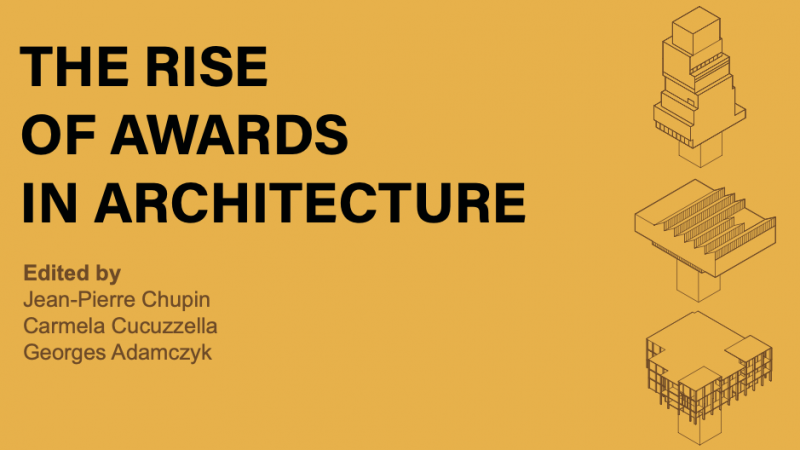Led by Jean-Pierre Chupin at the Université de Montréal, the Canada Research Chair in Architecture, Competition and Quality (CRC-ACQUA) contributes to raising the bar of quality in the built environment. Research projects, design competitions, critical exhibitions and databases examine the ability of buildings and public spaces to meet citizens’ expectations in terms of equity, social value and sustainability. These issues are addressed through the prism of awards of excellence, lived experience and project competitions, which are understood as epistemological filters and mechanisms for mediating quality.
NEWS

PUBLICATIONS
Professor Jean-Pierre Chupin and student Laurène Smith presented UdeM's research on the concept of inclusion in festive activities at the Entretiens Jacques Cartier conference in Lyon.
"Montreal and Lyon are both known as festive cities, hosting multiple events each year. But not everyone has the right to celebrate. “Festivals are places of contradiction. They are celebrations that are supposed to be open to everyone, yet they exclude people,” says Laurène Smith, a master's student in architecture under the supervision of Professor Jean-Pierre Chupin at the University of Montreal.
In an attempt to answer the question “Is the festive city inclusive?” and to discuss their research, these representatives from the UdeM School of Architecture participated in the Entretiens Jacques Cartier 2025, which took place this year in Lyon from October 6 to 8. “Last year, I organized a series of round tables on universal accessibility awareness for the Entretiens. As a continuation of this reflection, the organization Cité anthropocène suggested that we look at the festive city,” summarizes the professor, who works on the issue of inclusion in the organization of cities..."
Read more on the UdeMNouvelles website.
This event, dedicated to festive cities and their mechanisms of inclusion or exclusion, was also documented by the Cité Antropocène and McGill's Night-time Design Research Group. These resources provide further insights from the collaborating institutions:
The Cité Anthropocène website, which co-organized the meeting, presents the framework of the seminar “Is the festive city inclusive?” as well as the main issues addressed: https://cite-anthropocene.fr/seminaire-resilience-et-transitions-la-ville-festive-est-elle-inclusive/
McGill's Night-time Design Research Group, also involved in the event, offers a summary of the study day and presentations on nightlife, celebration, and inclusion: https://www.mcgill.ca/night-time-design/article/study-day-festive-city-inclusive
Photo by Getty.

EVENTS
Six one-hour sessions from November 3 to 21 (12:15 p.m. ET) (GMT-4)
Topics:
1 – Redefining quality in a partnership approach (Nov. 3)
2 – Advancing spatial justice (Nov. 7)
3 – Building more integrated resilience (Nov. 11)
4 – Accelerating inclusive design (Nov. 13)
5 – Transforming processes and policies (Nov. 19)
6 – Promoting urban health (Nov. 21)
It is with great pleasure that we invite the public to join the Public Forum on Quality organized by the SSHRC Partnership on Quality. In November, no less than 6 one-hour sessions will stimulate cross-site thematic clusters addressed to Canadians and beyond.
Research sites have been asked to select their most impactful proposed national action to raise the bar on quality. But they will only get 3 minutes to present their proposal in a pitch designed to convince you, the public, of its urgency, modalities and seeked impact.
For each session, Canadian and international invited experts will join members of the steering committee to share comments during a maximum of 10 minutes per proposed action. Everything will happen very quickly, and your reactions will be welcome.
For this public forum on Quality, we aim to target the wider public. We invite everyone to join as many of the sessions you find interesting, you do not have to be affiliated to the research project to join this event, the broader public is very much welcome. This event is public and is completely free.
Please register to as many sessions as you can. Registration is free but mandatory to receive the appropriate link.
Follow this link to register: https://forms.office.com/r/q7mJqsyENh

EVENTS
On Wednesday, September 10, at 5:15 p.m. in rooms 2081 and 2083 of the Faculty of Environmental Design, the Canada Research Chair in Architecture, Competition, and Quality, led by Professor Jean-Pierre Chupin at the University of Montreal, will present the large open-access digital platform: ArchiQualiData.
ArchiQualiData is being launched as part of the traveling exhibition “Quality Issues in Canada's Built Environment,” on display from August 29 to September 19.
ArchiQualiData is the resource platform for quality, lived experience, and awards of excellence in architecture, landscape architecture, interior design, and urban design in Canada.
This major national collaboration has received funding from the Canada Foundation for Innovation, the Quebec Ministry of Education, the University of Montreal, the Canada Research Chairs Program, and the Social Sciences and Humanities Research Council of Canada.
ArchiQualiData is hosted on the secure servers of the Digital Research Alliance of Canada.
Using filters, ArchiQualiData reveals more than 4,000 award-winning projects with links to design and architecture firms and agencies, as well as a map-based tracking system.
You can also discover an initial collection of more than 160 “positive experiences of quality” that provide a better understanding of what users and citizens feel and appreciate in public places (some award-winning, some lesser known, but always worth discovering), whether they are buildings or public spaces.
Finally, month after month, visitors will discover all the case studies, analyses, action plans, conferences, courses, and round tables, as well as, perhaps most importantly, roadmaps toward a more equitable, inclusive, and socially valuable quality. The ArchiQualiData platform is powered by researchers, students, and professional and social partners brought together in the Canada-wide SSHRC Partnership on Quality under the scientific direction of Professor Chupin.
Enjoy your discovery and, above all, learn to share your own experience of quality so that disciplines, professions, and decision-makers can think about and produce the built environment beyond silos and habits, in increasingly inclusive and sustainable ways.
Letʼs build a map of Canadaʼs public buildings and places that incorporates your own experience of quality!
Why does your experience matter to improve quality?
Our buildings, parcs and cities are still designed and based on visions that poorly consider the diverse experiences of the public. By informing decision-makers,students and designers, your voice can help make public buildings and places more inclusive, more valuable and more sustainable.
3 ways to contribute:
📷 Take a picture showing what you like in a public building or public space, along with a short description (300 words).
🎤 Record a voice message on your phone while experiencing the place you like and take a picture.
🎥 Take a short video and record your voice describing the place you like and take a picture.[vc_single_image image="27105" img_size="large" onclick="custom_link" img_link_target="_blank" css="" link="https://archiqualidata.ca/en?filters="]

EVENTS
Exposition itinérante du travail en cours sur les feuilles de routes élaborées par 15 équipes intersectorielles d’un océan à l’autre
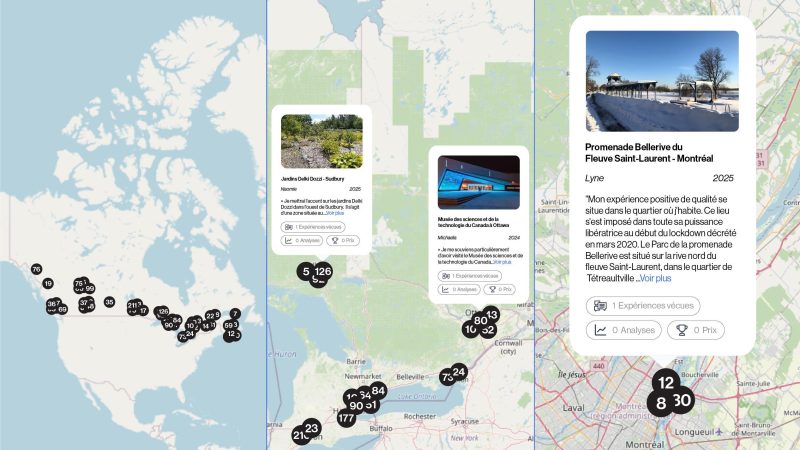
EVENTS
The ArchiQualiData database provides analyses and studies of exemplary and award-winning living environments, real-life experiences and case studies.
DISCOVER detailed studies conducted by researchers, providing unique insights into exceptional buildings and places.
ACCESS testimonials from people who have directly interacted with these entities, enriching understanding through authentic stories.
FIND precise information on each exemplary entity, thanks to a simple interface and advanced search system.
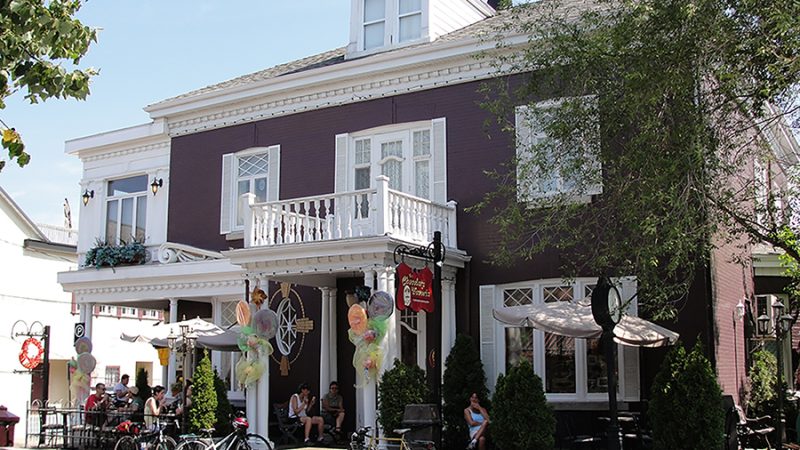
PUBLICATIONS
New article published in Le Devoir by Yolene Handabaka Ames, student of the individualized doctorate in architecture at the École d'architecture de la Faculté de l'aménagement: What's behind the demolition of Chocolats favoris' building in Vieux-Lévis?
"The case of the imminent demolition of Chocolats favoris has been making headlines since October 2023, when a public notice of demolition request from the City of Lévis was posted on the building's façade.
The saga, which lasted almost two years, revealed recurring conservation issues surrounding Quebec's built heritage. So much so that the Lévis residence has become an emblematic case of what lies behind most heritage building demolition projects: the social value of a “living” heritage.
In autumn 2022, the house that had housed Chocolats favoris since 1996 was closed due to water infiltration and deteriorating masonry. After professional appraisals, letters signed by heritage advocates, requests for review and the active participation of Lévis residents at public hearings, demolition was approved on December 16. A request for a one-year moratorium did not change the building's fate either. On June 19, at a regular meeting of the municipal council, elected officials voted against accepting the request. The house of Chocolats favoris will soon fall under the demolition pick... "
Read more on Le Devoir’s website.
Photo by René Bélanger (Flickr).

PUBLICATIONS
The City of Montreal has selected the Canada Research Chair in Architecture for research on the lived experience of quality by users of public buildings.
Jean-Pierre Chupin, Bechara Helal and Carmela Cucuzzella will develop a protocol for collecting lived experiences with doctoral students: Firdous Nizar, Paloma Castonguay-Rufino, Yolene Handabaka, Shantanu Biswas Linkon, Cyrille Tchango Ngamaleu of the Individualized PhD in Architecture program.
The proposal from the Canada Research Chair in Architecture, Competitions and Mediations of Excellence (CRC-ACME) team was selected in Stream 1 of the call “Developing a Stronger Design Culture, Together – 2nd Edition” (Call for Proposals 2023-2024).
Project: Protocol for investigating and qualitatively assessing the social value of public buildings through the collection of lived experiences by users
Description: Post-occupancy quality assessment protocol providing methods for collecting and analyzing testimonials about the experience of municipal sites and buildings, and creating a collection of stories and records of remarkable lived experiences. The aim is to gain a better understanding of the factors that influence the quality of the experience of municipal sites and buildings.
The project will enrich the strategies and actions for sustaining quality presented in the Quality Toolkit Design Montréal (section Quality Vision).
It will also contribute to achieving the results of the Montréal 2030 strategic plan, particularly with regard to the following priority:
Priority 19 – Provide all Montrealers with safe, quality living environments and a local response to their needs.
To learn more: https://designmontreal.com/trousse/la-qualite-ca-se-vit-au-quotidien
For more information on the program of Design Montréal:
https://designmontreal.com/appels/developper-ensemble-une-plus-forte-culture-du-design-edition-2?section=3948
Consult the complete report: https://designmontreal.com/s3fs-public/2025-05/protocole-valeur-sociale_udem.pdf?VersionId=wAorph2CDytrmoi-T9vjUZthx9Znz-Z
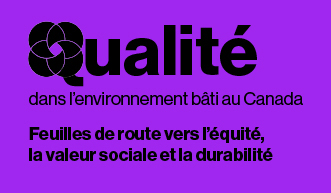
EVENTS
Toronto 2025 Convention Program : Toward a White Paper on Quality...
The final program for the 2025 Annual Convention is now available. From April 30 to May 2 in Toronto, the event will bring together experts, researchers, and practitioners to advance a national strategy for quality in Canada’s built environment. We are happy to share with you this program and hope you are as excited as we are for those great speakers, roundtables discussions and site visits that will take place during the convention.
Jean-Pierre Chupin, PhD, Professor, Architect MOAQ, MIRAC. Holder of the Canada Research Chair in Architecture, Competitions and Mediations of Excellence at Université de Montréal and Principal Investigator of the SSHRC Research Partnership on Quality in Canada’s Built Environment.
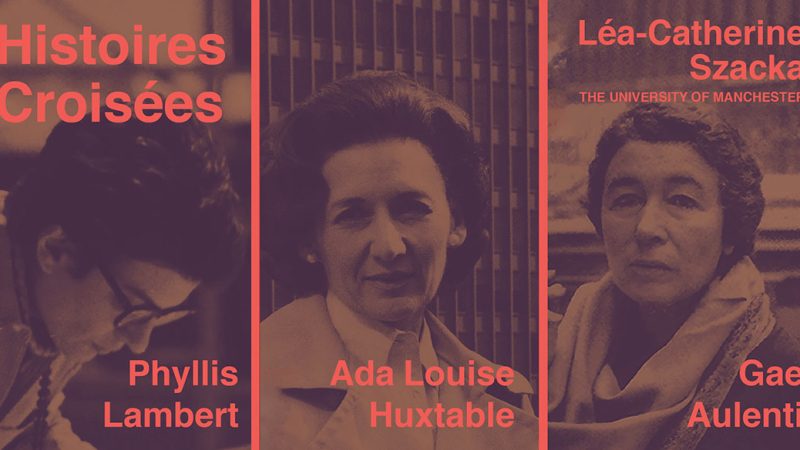
EVENTS
Conference by Léa-Catherine Szacka , University of Manchester
Date: Tuesday, April 1st at 5:30 pm.
Location: Amphitheatre 1120, Faculté de l’aménagement, Université de Montréal
Lecture series of the Laboratoire d’étude de l’architecture potentielle
Crossed Histories
Phyllis Lambert, Ada Louise Huxtable and Gae Aulenti on architecture and the city
Summary:
Born in the 1920s, architects Gae Aulenti and Phyllis Lambert and critic Ada Louise Huxtable were among the most influential figures in post-war architecture and design. Pioneers in a largely male-dominated field at the time, and key players in the transition from modernism to postmodernism, they set out to conquer and shape public space. This talk retraces the history and careers of these three women, who are the focus of the exhibition Crossed Histories, presented until May 2025 at the Canadian Cultural Centre in Paris.
Léa-Catherine Szacka:
Senior Lecturer (Associate Professor) in Architectural Studies, University of Manchester
Director of the Manchester Architecture Research Group (MARG)
Vice-President, European Architectural History Network (EAHN)
Co-Founder, PASZA - Platform for Architectural Research
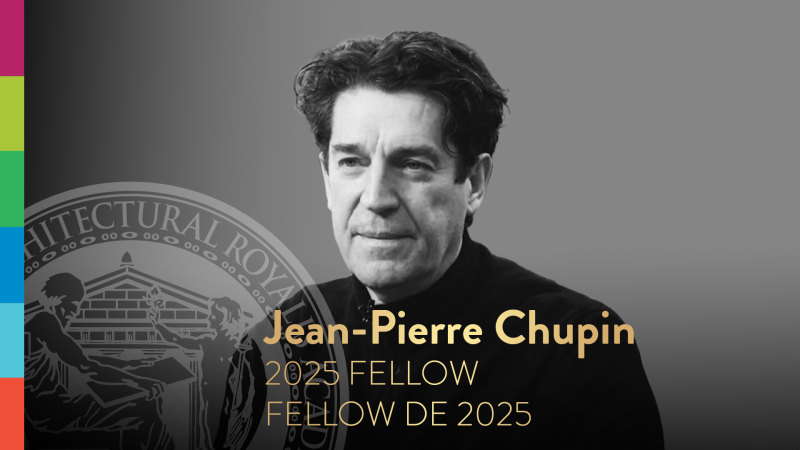
PEOPLE
Professor Chupin was nominated by Thierry Montpetit, FRAIC, and letters of support were submitted by five renowned Quebec architects: Anik Shooner, FIRAC, Nathalie Dion, FIRAC, Gilles Prud'homme, FIRAC, Maxime Frappier, FIRAC, and Renée Daoust, FIRAC, in the category of : Outstanding scholarly contributions supported by research, publications or teaching in the field of architecture, and, Outstanding contributions to the profession fostering excellence in architectural practice through leadership in public service or industry organizations.
Fellows will be formally inducted into the RAIC College on Tuesday, June 3, 2025 at an induction ceremony held in conjunction with the RAIC Conference on Architecture in Montreal, Quebec.
Visit the RAIC website to see the 43 new Fellows 2025.
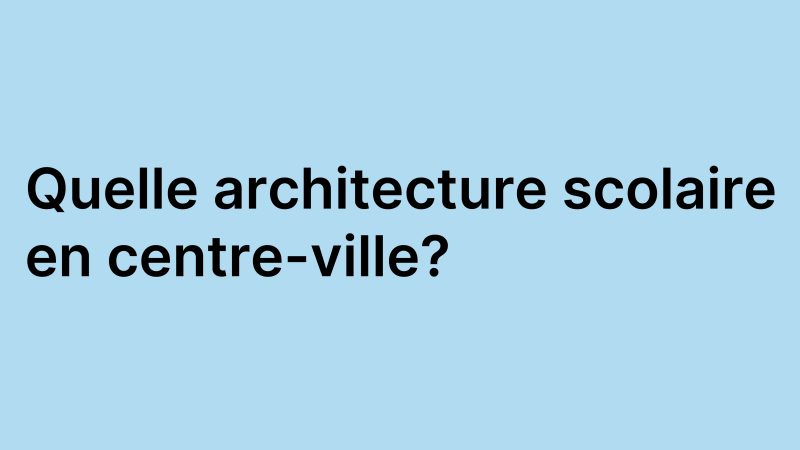
EVENTS
“From business districts almost exclusively reserved for commercial and professional activities, Canadian downtowns are increasingly becoming living spaces. Yet there are few elementary schools, which are essential to inclusive urban development. And for good reason: the traditional model of the single-purpose, low-rise school building, with a large playground at ground level, is at odds with a high-density, high-value environment. The heart of metropolises attracts developers, all the more so as urban planning regulations allow them to erect high-rise buildings, a source of significant revenue. So what kind of school architecture can we imagine for our city centers? And what might it offer schoolchildren?”
- A. Cormier, A. Paré and G. Adamczyk, En centre-ville : une architecture à hauteur d'enfant, Potential Architecture Books, Montreal, 2024
The Laboratoire d'étude de l'architecture potentielle (LEAP) recognizes the importance of the stakes involved in building schools downtown, and held a round table on this theme to mark the launch of the book En centre-ville : une architecture à hauteur d'enfant.
Moderator
Jean-Pierre Chupin, Architect and Professor at the School of Architecture, Université de Montréal, Chair Holder of the Canada Research Chair in Architecture, Competitions and Mediations of Excellence and Director of the LEAP
Panelists
Robert Beaudry, Montréal city councillor, Member of the Executive Committee, Responsible for OCPM urban planning and homelessness
Carol Bélanger, Chief Architect, City of Edmonton
Anne Cormier, Architect, Professor at the School of Architecture, Université de Montréal, Researcher at the LEAP
Ève Desrosiers, Architect, Héloïse Thibodeau architecte
Maryse Laberge, Architect, nfoe
Claude Laurin, Architect, Real Estate Planning and Development Coordinator, Centre de services scolaires de Montréal
Jordan Owen, Junior Developer, Mondev
The round table is supported by the Social Sciences and Humanities Research Council of Canada (SSHRC), the Vice-rectorat à la recherche, à la découverte, à la création et à l'innovation de l'Université de Montréal (VRRCDI) and the Laboratoire d'étude de l'architecture potentielle (LEAP).[vc_video link="https://vimeo.com/1011071339/907b73b83c" css=""]
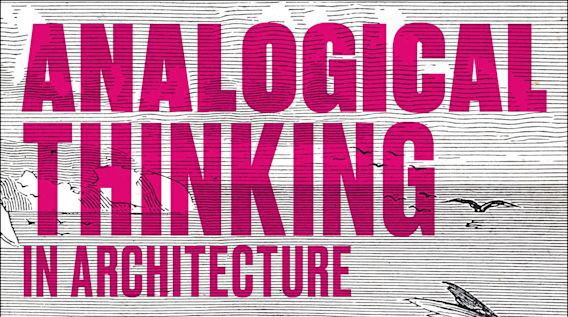
PUBLICATIONS
This book provides an in-depth exploration of the rich and persistent use of analogical thinking in the built environment. Comparing views on the role of analogies and metaphors by prominent voices in architecture and related disciplines from the 17th century to the present, the book shows how the “analogical world of the project” is revealed as a wide-open field of creative and cognitive interactions.

PUBLICATIONS
On the occasion of accessibility week at the Senate, La Presse echoes the research coordinated by researchers from the Université de Montréal who are members of LEAP and the SSHRC partnership on quality.
Click here to read the article.
SCIENCE BLOG
ARCHITECTURAL COMPETITIONS, PROMOTION OF EXCELLENCE AND CRITICISM OF OUR INSTITUTIONS: THE ROLE OF THE RAIC THROUGHOUT HISTORY
October 21 2024 / Samuel Dubois (Doctorant)
IN THE ARCHIVES OF JACQUES FOLCH-RIBAS, QUEBEC ARCHITECT WINNER OF NUMEROUS LITERARY PRIZES
December 12 2023 / Lucie Palombi (Doctorante)
ABOLISHING AWARD CATEGORIES GUARANTES NEITHER FAIRNESS NOR OPENNESS
September 27 2023 / Annie Thao Vy Nguyen (Étudiante) + Jean-Pierre Chupin, Ph.D.












































